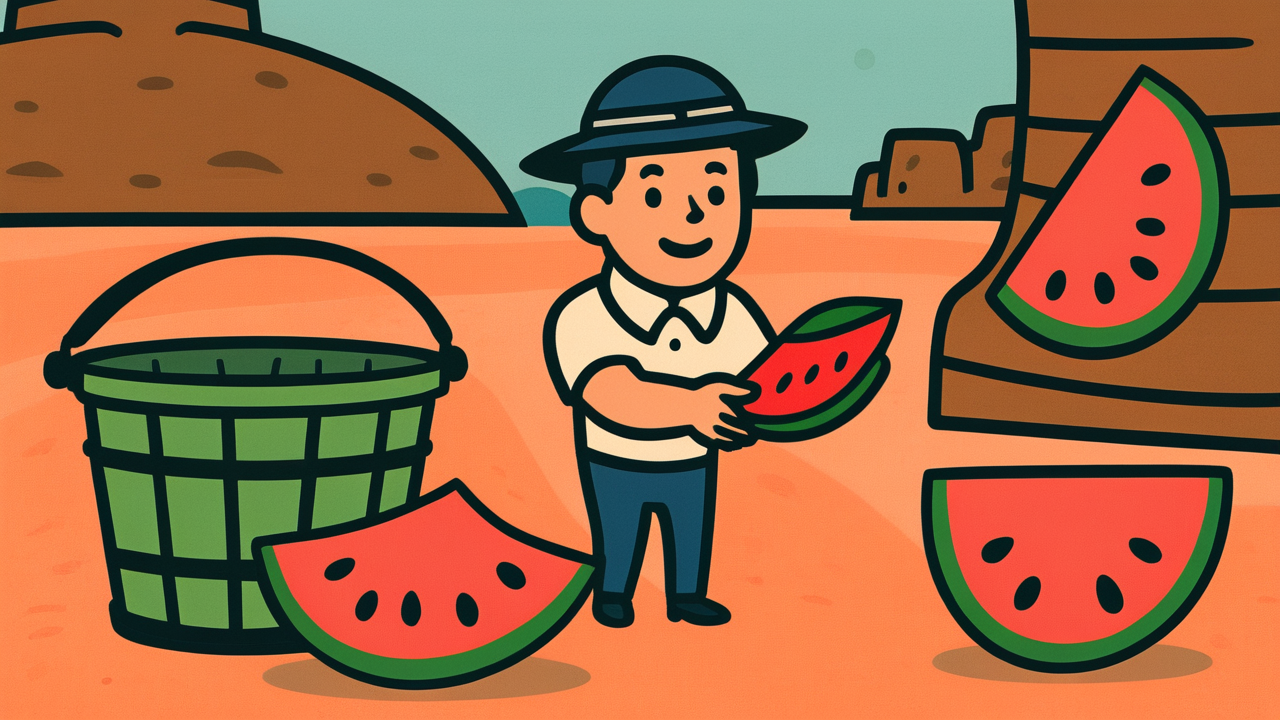How to Read “桶屋と西瓜は叩かねば食われぬ”
Okeya to suika wa tatakanakereba kuwarenu
Meaning of “桶屋と西瓜は叩かねば食われぬ”
This proverb expresses the meaning that “to succeed in things, appropriate action and effort are necessary.”
For a barrel maker to create good barrels, they need to carefully strike the wood to shape it properly, and with watermelons too, you cannot select delicious ones without striking them to listen to the sound and check their ripeness. In other words, without the proactive action of “striking,” neither can achieve the desired result.
This proverb is used in situations where a passive attitude leads nowhere. It contains the teaching that opportunities will not come just by waiting for chances, and that paths open only when you take action yourself. Even in modern times, you can understand the true meaning of this expression in situations that require proactive approaches, such as job hunting, sales activities, and building human relationships.
Origin and Etymology
When I researched the origin of this proverb, I was actually unable to find clear documentary evidence or established theory. The current situation is that it cannot be found in general dictionaries or proverb collections either.
Considering the combination of “barrel maker” and “watermelon (suika),” it is highly likely that this is an expression related to commerce and daily life during the Edo period. Barrel makers were one of the important craftsmen of that time, and when making casks and barrels, the work of striking wood to shape it was indispensable. On the other hand, there has long been a custom of lightly tapping watermelons to listen to the sound to check their ripeness.
This expression probably arose from such everyday acts of “striking,” but it is unclear when it began to be used or through what process it became established. It’s possible that what was once a regionally limited expression spread over time.
There are quite a few proverbs with unclear origins like this. Perhaps because the formation of words is shrouded in mystery, more attention is drawn to their meaning and usage.
Usage Examples
- Let’s have new sales staff embrace the spirit of “Barrel maker and watermelon if not struck cannot be eaten” and first proactively make customer rounds
- Since they say romance is also like “Barrel maker and watermelon if not struck cannot be eaten,” I decided to take the plunge and confess my feelings
Modern Interpretation
In modern society, the teaching of this proverb has become even more important. With the spread of SNS and the internet, information has become easily accessible, but at the same time, the dangers of maintaining a passive attitude have also been highlighted.
Especially in the business world, opportunities will not come around just by waiting. In modern times where entrepreneurial spirit and proactive attitudes are valued, the proactive action of “striking” has become an essential skill. Even in job hunting, it’s clear that people who directly approach companies or utilize personal networks, rather than just browsing job sites, have higher success rates.
On the other hand, in modern times, more people have negative images of the expression “striking,” associating it with power harassment and pressure. However, the original meaning of this proverb is not about hurting others, but about making appropriate approaches at appropriate times.
Perhaps because we live in a digital age, the value of direct human-to-human communication and real action is being rerecognized. While online information gathering is important, the importance of ultimately moving with your own feet and speaking with your own voice remains unchanged.
When AI Hears This
The fact that a single verb “tataku” (to tap/strike) can express such vastly different forms of expertise reveals a fascinating characteristic of the Japanese language. For a barrel maker, “tataku” means the sophisticated physical skill of judging wood quality from its resonant sound and shaping it with precisely the right amount of force. Meanwhile, tapping a watermelon represents the sensory judgment ability to determine ripeness through subtle differences in sound.
What these two forms of “tataku” share is the “art of listening” that lies beneath the surface physical contact. Barrel makers read the internal density and moisture content of wood from minute changes in the sounds it produces. With watermelons, they distinguish the distinctive resonance created by the fruit’s water content and sugar levels. Neither involves simply applying force—both represent an integrated intellectual process of “tap, listen, and judge.”
Even more noteworthy is that both skills represent “tacit knowledge” that can only be acquired through experience. The subtle sensory distinctions that resist manual documentation become embedded in the body through years of practice. Japanese captures this fusion of physical and intellectual skill with just one everyday verb: “tataku.” It’s a brilliant example of how linguistic economy and expressive richness can merge seamlessly.
Lessons for Today
What this proverb teaches us today is the importance of balancing “waiting” and “acting.” Precisely because we live in an age overflowing with information, we tend to indulge in the comfort of being passive, but truly valuable things cannot be obtained without taking action ourselves.
Around you too, there are surely many things worth “striking.” Challenging new hobbies, speaking to someone you’re interested in, taking a step toward changing jobs, engaging in creative activities. The first step requires courage, but that small act of “striking” might open unexpected doors.
What’s important is knowing how to strike. Barrel makers strike with understanding of wood’s properties, and we strike watermelons knowing their characteristics. Rather than acting blindly, proactive approaches based on understanding the other party and situation are the true teaching of this proverb. Starting today, why don’t you try gently but surely tapping the watermelon that is life?



Comments